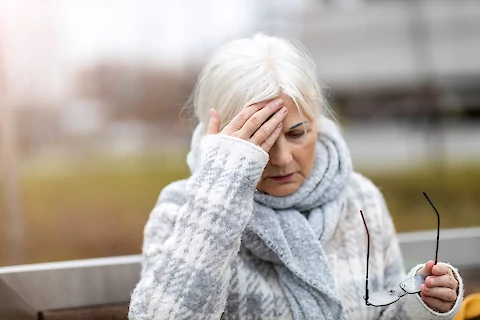
Signs of Seasonal Affective Disorder for Seniors
Winter brings gloomy days and freezing weather to Oklahoma City and other cities across the nation, sometimes for several weeks at a time. It's entirely plausible to experience some wistfulness during the prolonged winter season, given the biting cold and holiday rush. This is particularly true for seniors, who may experience the twin pains of restricted movement and social seclusion more intensely at the end of the year. However, if you or a loved one experiences profound sadness, lack of energy, or irritability for a prolonged period, experts warn that you could be suffering from seasonal affective disorder, or SAD.
What Is Seasonal Affective Disorder?
Seasonal affective disorder is a type of depression that occurs in cycles. People suffering from winter-induced SAD will typically experience depression symptoms as the weather becomes colder, and the days become shorter.
How do SAD and general depression differ? SAD, as opposed to general depression, occurs at specific times of the year and often resolves on its own. SAD can affect older adults more severely in the winter due to social isolation and fewer friends. So how can you tell if you or a loved one displays signs of SAD?
How to Spot SAD in Seniors
While the fall and winter are renowned as some of the most wonderful seasons of the year because of the sparkling lights and joyful atmosphere, they can also be a trying time for many people. Anyone, regardless of age, can experience seasonal affective disorder. It is essential to understand the symptoms of SAD in seniors and to seek help for a loved one who may require it.
Seasonal Affective Disorder Symptoms in Older Adults
Seniors with seasonal affective disorder frequently experience milder symptoms in the late fall and early winter, which worsen as the season progresses. Here are some typical signs that you or a loved one is likely experiencing SAD:
- Generally experiencing melancholy, hopelessness, or guilt
- Loss of interest in previously enjoyed passions
- Tiredness, mental fog, or a lack of motivation
- Having unusually long or short sleep periods
- Concentration problems
- Anxiety or restlessness
- Weight or appetite fluctuations
SAD symptoms often resemble those of other medical conditions. If you notice any of these symptoms in your senior or yourself, make an appointment with a primary care physician. To rule out additional health problems, your doctor might perform some tests and make necessary follow-ups.
How to Treat Seasonal Affective Disorder in Elderly People
For older people, in particular, many symptoms may be precursors to other conditions or illnesses. To ensure that a more serious health issue is not overlooked, it is crucial to talk to a doctor about the likelihood of SAD or chronic depression.
Light therapy is frequently recommended as the first line of treatment for SAD. Seniors should, whenever possible, take considerable time in the sun outdoors or use a sunlamp to simulate the benefits of natural sunlight indoors. Mitigate Seasonal Affective Disorder with vitamin supplements. Most importantly, to help their elderly loved one cope with the condition, family members and caregivers should be kind and supportive. Keeping them at ease and comfortable can also lessen their symptoms.
Would you like to discuss in greater detail the potential effects of winter on your senior family members? Are you looking for qualified assistance in providing In-Home Care? We are ready and willing to assist you.
At-Home Care With Senior Helpers of Greater Oklahoma City
Senior Helpers of Greater Oklahoma City is a premier individualized, in-home senior care provider. Our companions are vetted and bonded. They can, indeed, assist your family with some burdens associated with caring for an elderly relative. We are committed to offering exceptional in-home senior care services in Oklahoma City, Edmond, Norman, and the neighboring areas. To find out more about our services, contact us today.